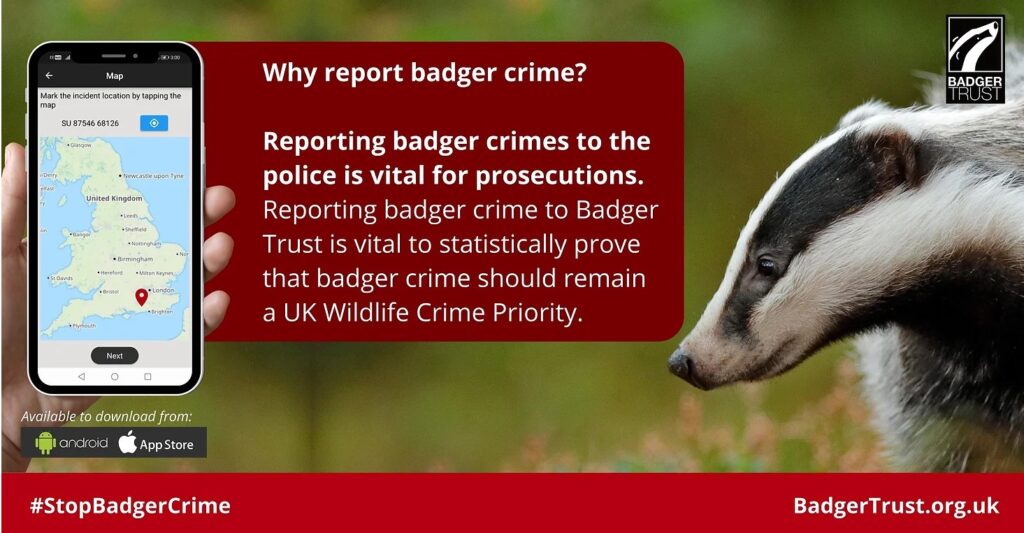Badgers have a long history of cruelty and persecution in the UK, spanning hundreds of years. To this day, badgers remain among the most persecuted of all species despite having one of the highest levels of legal protection.
From blood sports to development concerns, thousands of badgers become the victims of wildlife crimes each year. Furthermore, the government-endorsed legal persecution of badgers – in the form of the controversial badger cull – effectively undermines the badger’s protected status.
The Badger Watch App

The Badger Watch app has been developed as a FREE tool for members of the public and Badger Groups to easily recognise, record and report instances of badger crime when on the move out in the field. This can save crucial time especially when witnessing crime as it occurs. The app is now in both the Google Play Store and the Apple App Store for you to download.
Stopping Badger Crime film
The Badger Trust has created a short film, Stopping Badger Crime, which aims to raise public awareness of crimes against badgers and encourage reporting. Presented by naturalist and broadcaster Mike Dilger, the hard-hitting film reveals the different methods used to persecute badgers and how to recognise the signs. The film also shows how recording and reporting badger crime helps investigators bring offenders to justice.
Warning: the film contains distressing content
Types of Badger Crime
Badger Crime is diverse and can include activities from badger baiting, shooting, snaring, poisoning, and lamping badgers with dogs, to sett interference such as blocking entrances or destruction of the sett in its entirety.
Badger crime can be broadly grouped into three categories:
Malicious Crime
Malicious badger crimes are crimes in which the perpetrator has purposefully targeted a badger or a badger sett. Often violent and organised in nature, malicious badger crime has also been linked to crimes against humans. News reports of criminals convicted of badger crime throughout 2022 demonstrated the link between crimes against badgers and crimes against humans; most offenders convicted of badger crime had previous convictions for crimes including domestic violence, robbery, and grievous bodily harm. Malicious badger crimes include sett interference, snaring, shooting, lamping and badger baiting. Learn more about malicious badger crime>>
Negligent Crime
Negligent badger crimes are activities which result in badgers or their setts being disturbed or harmed without the malicious intent to do so. Even when badgers or their setts are disturbed or harmed by accident, such incidents are classed as criminal in the eyes of the law. Negligent badger crimes can be related to forestry, farming, development, and dogs getting stuck in setts. Learn more about negligent crime>>
Cyber-enabled Crime
Cyber-enabled wildlife crime is the act of using the internet to facilitate illegal wildlife activities (e.g. selling endangered species or their by-products, for example, ivory or rhino horn). For badgers, it mainly relates to promoting badger persecution by sharing in online spaces such as social media platforms. Badger crime is also linked to cyber-enabled criminal activities. Both badger persecution and cyber-enabled crime are listed as ‘UK Wildlife Crime Priorities’ by the National Wildlife Crime Unit. Learn more about cyber-enabled crime>>
Read the Badger Trust and Naturewatch Foundation Badger Crime Guide:
What can YOU do about badger crime?
- What to do if you suspect a badger crime: Recognise, Record, Report
- Donate to protect badgers
- Get active in our GBG group and help protect badgers near you
- Keep up-to-date with the latest badger crime news
- Download the Badger Watch app
- Download free badger crime resources
- Write to your MP asking for tougher sentencing to protect badgers
- Write to your MP about the Online Safety Bill
